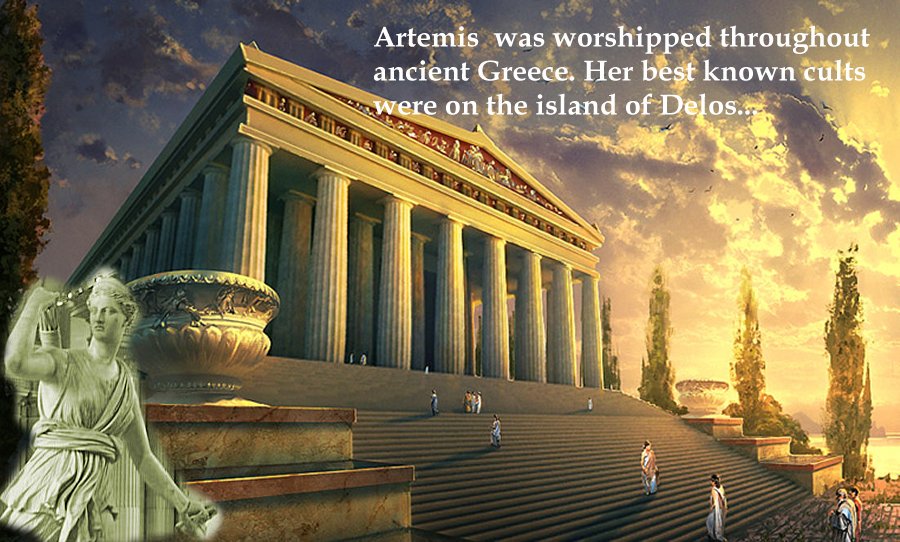Goddess Artemis – One Of The Most Respected Olympians
A. Sutherland - AncientPages.com - A young maiden with a hunting bow and quiver of arrows is widely known from ancient Greek art. Her name is Artemis.
Artemis was the twin sister of Apollo, and their parents were Zeus and Leto, the beautiful daughter of the original Titans Coeus and Phoebe. She was the goddess of the hunt, forests, hills, the Moon, archery, wild animals, fertility, childbirth, and the patron of young women.
However, both she and her brother Apollo were also able to bring disease and even death if necessary; Artemis targeted the women and girls, while Apollo targeted the men and boys, but like her twin brother Apollo, she was also capable of healing and curing diseases amongst humans. They were both worshiped in several places.
There were, however, some dissimilarities between the siblings. First of all, Artemis had nothing to do with poetry or music. Moreover, she was not regarded as an oracular divinity like her brother, Apollo.
Homer refers to her as Artemis Agrotera, Potnia Theron: "Artemis of the wildland, Mistress of Animals," and she was often depicted with them. She also profoundly venerated the cypress and deer.
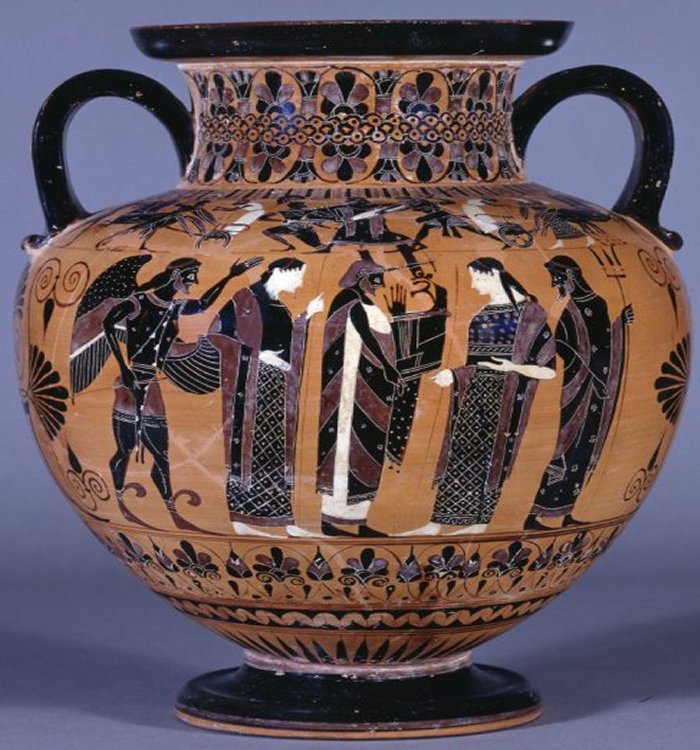 Apollo plays his Kithara between Artemis and Leto. Attic Black-Figure Amphora, ca. 550 BC. British Museum, London
Apollo plays his Kithara between Artemis and Leto. Attic Black-Figure Amphora, ca. 550 BC. British Museum, London
This popular goddess (also called Diana in Roman mythology) was worshiped in many places and was among the most respected Olympians. Many scholars believe that Artemis's name and the goddess herself are ancient, originally pre-Greek, from prehistoric ancient Greece before the first Proto-Greek settlers appeared in the area.
Mythological sources say that as a child, Artemis was thrown away by Hera. In grief, she asked her father Zeus for six wishes that Zeus agreed to. One of these wishes was that she always wanted to remain a virgin. She gathered her pack of virgin hunters.
Beautiful gold hairnet with a relief of Artemis, goddess of the hunt, dated as from 200 B.C. from the Karpenisi Treasure. Credit: National Archaeological Museum, Athens
Her favorite hunting partner was Orion, but one day, Orion was killed by Artemis or Gaia. Or did it, perhaps, her brother who sent the scorpion that killed Orion?
Like her brother, the island of Delos was also her birthplace. In this place, Leto had found refuge after being persistently chased by Hera, the wife and one of three sisters of Zeus in the Olympian pantheon of Greek mythology and religion.
There are many conflicting accounts regarding the birthplace of Artemis and Apollo.
According to Bibliotheca of Pseudo-Apollodorus, a compendium of Greek myths and heroic legends, 'Leto had relations with Zeus, for which she was harassed by Hera all over the earth. Leto finally reached Delos and gave birth to Artemis, who immediately helped her mother to deliver Apollo…'
Statue of Artemis, from Mytilene, Lesbos, Roman copy of a 4th century BC type, Istanbul Archaeology Museum. Uploader: Marcus Cyron - CC BY-SA 2.
"Artemis convinced her father to grant her six wishes: to remain eternally unmarried and chaste; to possess a bow and an arrow and a tunic for her hunting; to have various names that would distinguish her from her brother; to have sixty "daughters of Okeanos," all at the age of nine, to be her choir; to have twenty Amnisides Nymphs [of the river Amnisus, Crete] and handmaiden to look after her most prized possessions: her dogs and bow during her resting period; and to be the Light Bringer. She desired to assist women in pain during childbirth.
Artemis believed that the Fates had chosen her to be a midwife, but she carefully secured her chastity and remained a pure virgin. Those devoted to Artemis were bound to live pure and chaste. Any transgression of their vows of chastity didn't go unpunished..." 1
Written by – A. Sutherland AncientPages.com Staff Writer
Updated on December 6, 2023
Copyright © AncientPages.com All rights reserved. This material may not be published, broadcast, rewritten or redistributed in whole or part without the express written permission of AncientPages.com
Expand for referencesReferences:
1. Weaver, S. Greek Gods: The Olympians of Greek Mythology
Bremmer Jan N., Erskine A., (edition) - The Gods Of Ancient Greece: Identities and Transformations
More From Ancient Pages
-
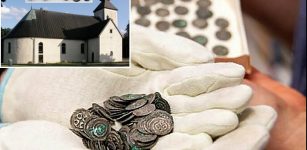 Trove Of Coins Dating Back To The 1100s Found On Visingsö, Sweden
Archaeology | Apr 8, 2024
Trove Of Coins Dating Back To The 1100s Found On Visingsö, Sweden
Archaeology | Apr 8, 2024 -
 Capoeira: Ancient Martial Art Disguised As A Dance Became A Symbol Of Resistance To Oppression
Ancient History Facts | Jun 8, 2018
Capoeira: Ancient Martial Art Disguised As A Dance Became A Symbol Of Resistance To Oppression
Ancient History Facts | Jun 8, 2018 -
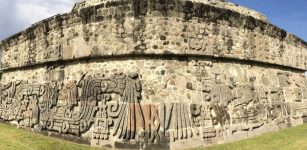 Xochicalco: Stunning Ruins Of Sacred City Linked To Maya and Aztecs Civilizations
Featured Stories | Feb 26, 2018
Xochicalco: Stunning Ruins Of Sacred City Linked To Maya and Aztecs Civilizations
Featured Stories | Feb 26, 2018 -
 Unusual Rock With Ancient Paintings Discovered By Hiker In Norway
Archaeology | Jun 23, 2023
Unusual Rock With Ancient Paintings Discovered By Hiker In Norway
Archaeology | Jun 23, 2023 -
 Ancient Mystery Of The Strange, Small Underground Being Who Secretly Emptied Casks
Featured Stories | Dec 8, 2024
Ancient Mystery Of The Strange, Small Underground Being Who Secretly Emptied Casks
Featured Stories | Dec 8, 2024 -
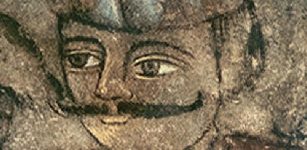 On This Day In History: Vlad II Known As Vlad Dracul (‘Vlad The Dragon’) Was Born – On August 30, 1400
News | Aug 30, 2016
On This Day In History: Vlad II Known As Vlad Dracul (‘Vlad The Dragon’) Was Born – On August 30, 1400
News | Aug 30, 2016 -
 African Skeletons From Early Colonial Mexico And First-Generation Slaves
Archaeology | May 4, 2020
African Skeletons From Early Colonial Mexico And First-Generation Slaves
Archaeology | May 4, 2020 -
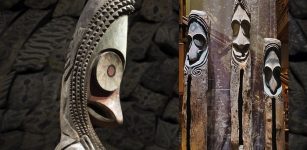 Curious Alien-Looking Slit Gongs Figures From Vanuatu Allowed Villagers To Communicate
Ancient Traditions And Customs | Sep 24, 2018
Curious Alien-Looking Slit Gongs Figures From Vanuatu Allowed Villagers To Communicate
Ancient Traditions And Customs | Sep 24, 2018 -
 Unusual Mini Temples Discovered In Ancient Roman Camp In Haltern, Germany
Archaeology | Nov 16, 2023
Unusual Mini Temples Discovered In Ancient Roman Camp In Haltern, Germany
Archaeology | Nov 16, 2023 -
 Elusive Celtic Otherworld Where Tuatha Dé Danann Reside And Time Passes Slower
Celtic Mythology | Apr 7, 2018
Elusive Celtic Otherworld Where Tuatha Dé Danann Reside And Time Passes Slower
Celtic Mythology | Apr 7, 2018 -
 Who Was King Menes? Mystery Of This Legendary Ruler May Go Back 20,000 Years
Civilizations | May 1, 2017
Who Was King Menes? Mystery Of This Legendary Ruler May Go Back 20,000 Years
Civilizations | May 1, 2017 -
 Unique Geoglyphs In Torgay, Kazakhstan – Destroyed
Civilizations | Sep 5, 2015
Unique Geoglyphs In Torgay, Kazakhstan – Destroyed
Civilizations | Sep 5, 2015 -
 Mysterious Ancient Inscription With Unknown Language Found Near Lake Bashplemi, Georgia
Linguistic Discoveries | Dec 4, 2024
Mysterious Ancient Inscription With Unknown Language Found Near Lake Bashplemi, Georgia
Linguistic Discoveries | Dec 4, 2024 -
 On This Day In History: Great Siege of Malta: Ottoman Forces Made Attempt To Conquer Malta And Failed – On May 18, 1565
News | May 18, 2016
On This Day In History: Great Siege of Malta: Ottoman Forces Made Attempt To Conquer Malta And Failed – On May 18, 1565
News | May 18, 2016 -
 Oldest Human Genome From The Iberian Peninsula Helps Reconstructing Human History
Archaeology | Mar 1, 2023
Oldest Human Genome From The Iberian Peninsula Helps Reconstructing Human History
Archaeology | Mar 1, 2023 -
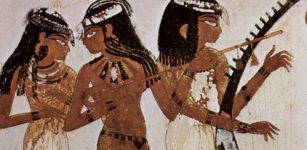 How And Why Did Ancient Egyptians Women’s Rights Change During The Greco-Roman Period?
Archaeology | Apr 16, 2019
How And Why Did Ancient Egyptians Women’s Rights Change During The Greco-Roman Period?
Archaeology | Apr 16, 2019 -
 Scientists Say Large Mammals Shaped The Evolution Of Humans – Here Is What Happened
Featured Stories | Jan 27, 2023
Scientists Say Large Mammals Shaped The Evolution Of Humans – Here Is What Happened
Featured Stories | Jan 27, 2023 -
 Native American Legend Of Apotamkin Teaches Children Obedience
Featured Stories | May 14, 2019
Native American Legend Of Apotamkin Teaches Children Obedience
Featured Stories | May 14, 2019 -
 Mysterious Grave Of King Valdemar IV Atterdag – Will The 600-Year-Old Historical Puzzle Ever Be Solved?
Featured Stories | Jul 14, 2018
Mysterious Grave Of King Valdemar IV Atterdag – Will The 600-Year-Old Historical Puzzle Ever Be Solved?
Featured Stories | Jul 14, 2018 -
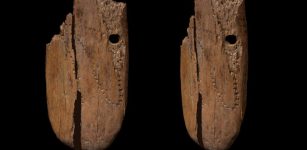 41,500-Year-Old Ivory Pendant Is The Oldest Evidence Of Humans Decorating Jewelery In Eurasia
Archaeology | Nov 26, 2021
41,500-Year-Old Ivory Pendant Is The Oldest Evidence Of Humans Decorating Jewelery In Eurasia
Archaeology | Nov 26, 2021

